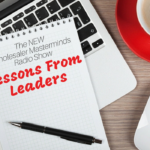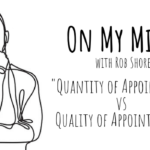Is The Sea of Sameness swallowing you up?
Are you establishing clear and identifiable points of differentiation in your practice?
Are you prepared for the seismic change rattling through our business?
Dennis Moseley-Williams is an entrepreneur (founder of DMW Strategic Consulting) and author (Serious Shift: How Experience Staging Can Save Your Practice). He is also a certified expert of the Experience Economy (Pine and Gilmore).
Serious Shift: How Experience Staging Can Save Your Practice, is available at amazon.com.
Wholesaling In The Experience Economy
Wholesalers have had a good process for a long time that, up until recently, had worked well. Take a good product that is in demand, make it cheaper for the investor, make it pay more to the advisor, buy a lot of ads and exposure, run a lot of meetings and seminars in the territory, and sell a lot of product. If you can create demand for something you already have, increased sales will take care of themselves.
There is an overlooked alternative to increasing sales. If you can offer a scarce or coveted good or experience that other’s can’t, you win. What is both scarce and in demand? The answer: things that are difficult – difficult to conceive, to convey and to deliver. Products aren’t scarce, whether they are mutual funds, annuities or insurance. However, almost everyone has the same thing for sale, and if you do genuinely have an offering that is rare and unique, it won’t be for long. Just about the only thing that is not available in unlimited supply is a wholesaler willing to do the difficult work.
Sharing a fact sheet isn’t hard. Knowing how your products match up against your competitors’ products isn’t hard. Showing up and presenting the features and benefits of your products isn’t hard either. Neither is sponsoring a dinner for your client’s clients, or taking a group of advisors golfing. None of this is truly difficult, and it isn’t scarce. Almost everything taught at wholesaler school is easy to do. You can make a fund, and sell it or an annuity cheaper and more easily than ever before.
Commoditization is the process by which goods that have economic value and are distinguishable in terms of attributes end up becoming commodities, indistinguishable in the eyes of the market. One growth fund is the same as every other growth fund, the literal opposite of scarce.
There is more of everything, more funds, more wholesalers, more choice, more variation and, of course, lower prices and margins too. So predictably, everyone is racing to the bottom, offering the most for the least.
What is the only salvation from this race to the bottom?
Difficult work.
Your absolute only alternative, your only hope is to create something valuable, something that people care about and will pay more for. If you can offer a scarce and coveted good or service that others can’t – or won’t – you win.
The good news is that any wholesaler can create something of value because it has nothing to do with products. It’s just more difficult. Not impossible, just unusual.
What’s difficult? Being different. How? By redefining and reconsidering the potential of your work and your capacity to help, and by finding new ways to bring value to your customers versus protecting and defending the status quo. The status quo isn’t just what we have always done in the past to succeed; it’s what we all believe is the right thing to do – until it isn’t.
In the Experience Economy, the customer is the product and the ultimate goal of the business is to help guide a meaningful change within the client. This means to understand his or her aspirations and to then provide the resources they need to become a better – if not the best – version of themselves.
Not too long ago, wholesalers were preoccupied with one question: How do I find more advisors to sell my products to?
In the Experience Economy, wholesalers are guided by different questions:
How can I create more value, more insight, more meaning in my work?
How can I matter more to my clients, in ways that help to differentiate me, if not my products?
Wholesalers who can do difficult work will always be in demand because they have the courage to try something that might not work or might be an idea a little ahead of its time. And yet our default is to do the easy work, the busywork, work that requires activity but not real effort or courage. That’s true of individuals and it’s true of companies. That’s because we see our role as cranking out average stuff for average people, pushing down price, and, at best, marginally improving value. That used to be the way to grow an organization.
No longer. The world will belong to those who create something scarce, not something cheap. The race to the top has just begun.
Written by Dennis Moseley-Williams


 Death by Referrals with Kirk Lowe
Death by Referrals with Kirk Lowe Never Be Average Wholesaling with Tim McCormick
Never Be Average Wholesaling with Tim McCormick Lessons From Leaders #7: Interview with Kevin McGarry, National Sales Manager, Nationwide Mutual Funds
Lessons From Leaders #7: Interview with Kevin McGarry, National Sales Manager, Nationwide Mutual Funds On My Mind: Quantity of Appointments vs Quality of Appointments
On My Mind: Quantity of Appointments vs Quality of Appointments Is Grit a Wholesaler’s Most Important Attribute? with Dr. Eric Frazer
Is Grit a Wholesaler’s Most Important Attribute? with Dr. Eric Frazer